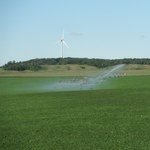
NDSU Extension
Irrigation provides more consistent crop production on a year-to-year basis, allows growth of longer-season crops, diversifies the farm enterprise and provides a consistent supply of forage for animal operations.
“However, managing an irrigation system around variable rain events can sometimes be a challenge for busy farmers,” says Tom Scherer, North Dakota State University Extension agricultural engineer.
To provide producers with some assistance, NDSU Extension is holding a virtual irrigation workshop Dec. 15-16 via Zoom. The workshop will consist of sessions from 9 to 11:30 a.m. both days.
Register for the workshop online through the North Dakota Water website at https://ndwater.org/waterconvention. The registration fee will be $30. However, participating in the workshop is free of charge for those who register for the 57th annual North Dakota Water Convention.
“Having a virtual irrigation workshop has some benefits in that there will be three presentations by irrigation professionals from the University of Nebraska and Colorado State University,” Scherer says.
The topics that will be presented during the Dec. 15 session will include a description of a remote sensing and irrigation management project that is just starting in North Dakota, an update on the Natural Resources Conservation Service’s EQIP program, remote monitoring of soil moisture levels and an update on research at NDSU’s Oakes Irrigation Research site.
The featured presentation will be on the Testing Ag Performance Solutions (TAPS) program (https://taps.unl.edu) developed at the University of Nebraska. This program facilitates a number of interactive real-life farm management competitions centered around irrigation management.
The topics that will be presented on Dec. 16 will include an update on research at NDSU’s Nesson Valley Irrigation site near Williston, management of saline/sodic soils, remote soil moisture measurement methods and a North Dakota irrigation system centered around potato production.
The featured presentations, both by colleagues from Colorado State University, will deal with the benefits of residue management under irrigation and evaluation of 10 years of using unmanned aerial systems (UAS) for irrigation management.
These are very timely topics, according to Scherer.
“What a difference a year makes in crop production,” he says. “Unlike last year, the 2020 growing season, along with harvest, was relatively trouble free. An early frost may have caused some yield loss in soybeans, but corn yields didn’t appear to be affected. We had more heat units in June and July than most of the recent growing seasons, and with variable rain events, managing irrigation systems was certainly a challenge.
“The use of remote monitoring of important growth parameters such as growing degree days, crop water use, rain received at the field and soil moisture status on a daily basis also are an important part of irrigation management,” he adds. “Remote monitoring methods generate a great deal of data, which make it difficult to interpret for day-to-day irrigation decisions. Thus, some of the topics selected for the irrigation workshop will focus on remote monitoring methods for irrigation management.”
